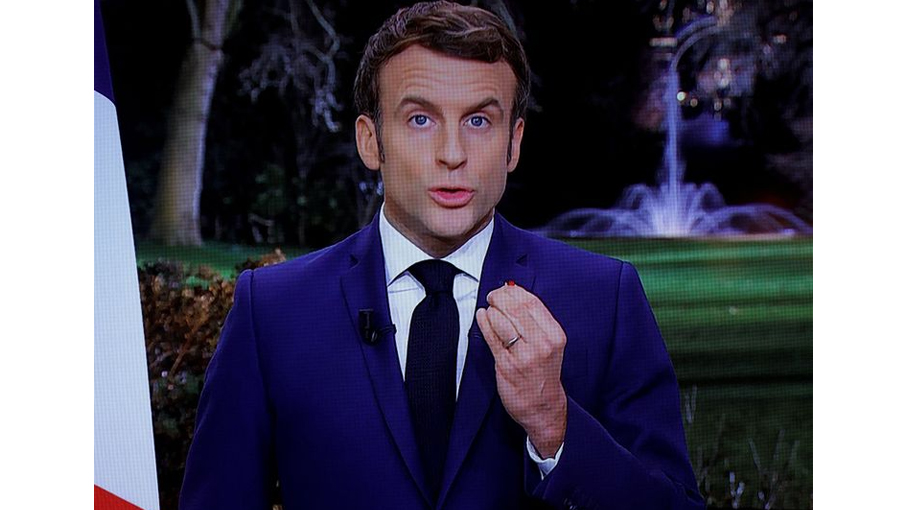Macron leads a nation that has shifted to the right
The incumbent became the first French president to be re-elected in two decades

C’est sera sera, as the French say. What will be will be. Perhaps that sentiment is a little too passe given that last Sunday’s presidential election was supposed to be closer — but it did work out all right in the end for Emmanuel Macron.
President since 2017, he faced the prospect of being yet another French leader who might become a one-term wonder. Not in 20 years had an incumbent managed to successfully campaign for another term in the Elsyee Palace. And for a while it indeed looked as if French voters might finally give enough support to the ideas promoted by the far right in the guise of Marine Le Pen, leader of the National Rally.
But in the end, it was a rather comfortable win for Macron. He won the run-off with 58.5 per cent compared with Le Pen’s 41.5 per cent — comfortable if not quite as resounding as his 2017 thumping of her by 66 to 33 per cent. Back in 2017, he became France’s youngest president. For Le Pen, she fell short in her third successive run — and if there’s a consolation for her, it is that secured the most votes ever for a French far-right candidate.
Macron’s re-election has been broadly welcomed by EU
leaders, perhaps recognition that he offers the best chance
now to find a negotiated end to the conflict
raging on its eastern border
It was a fact that Macron acknowledged in a victory speech on the Champ de Mars in the shadow of the Eiffel Tower. “I also know that many of our compatriots voted for me today, not to support the ideas I hold but to block those of the extreme right,”he said.
“And I want to thank them here and tell them that I am aware that this vote binds me for the years to come. From now on, I am no longer the candidate of one camp but the president of all.”
Le Pen’s challenge to the country’s mainstream order and the West’s unity against Russia had leaders in capitals from Washington to Warsaw worried amid the conflict now on Europe’s doorstep in Ukraine. France is the second-largest economy in Europe, the only Nato power in Europe armed with nuclear weapons, and possesses the largest military forces there too.
Even in defeat, Le Pen said the unprecedented vote total represented “a shining victory in itself,” adding: “The ideas we represent are reaching summits.”
After five years of economic turmoil exacerbated by two years of strict lockdown restrictions because of coronavirus, Macron’s re-election could never be taken for granted.
As it was, the campaign was beset by apathy, with many voters dissatisfied with both candidates and the turnout some three points lower than it was five years ago. Politicians from across the political spectrum — both left and right — can take little comfort that nearly one voter-in-three simply abstained over two rounds of voting.
Perhaps Macron, 44, was simply the least objectionable given that the level of his victory surpassed his polling numbers, surging in the final stages to earn five more years at the helm of one of the continent’s two major powers.
He becomes the first president since Jacques Chirac to secure a second term in office but must now confront domestic dissatisfaction, the effects of the pandemic and war on the continent.
But first up, he must also battle to keep his parliamentary majority in legislative elections in June.
But France has changed and is shifting to the right or, at the very least, believes that ideas promulgated by the far right are not now anathema to the French values of liberty, equality and fraternity.
In 2002, Chirac won a landslide 82 per cent victory over Jean-Marie Le Pen, Marine’s father, in a swell of opposition to his hard-line anti-immigration stance.
In recent years, Marine Le Pen has sought to soften her image and distance her party from her family’s often toxic political legacy.
Those who voted for National Rally policies did so because of its focus on the rising cost of living.
But Macron too is a leader who has long-proven adept at getting what he wants.
Before running for the presidency, he had served as the minister of economy, industry and digital affairs under Prime Minister Manuel Valls from 2014 to 2016. Formerly an investment banker, he joined politics in 2006 as a member of the Socialist Party.
A charismatic and astute personality, he rose rapidly in his political career and served as deputy secretary-general under Francois Hollande’s first government in 2012 before proceeding to hold other significant positions in the Valls government, including a stint as the French minister of economy.
His En Marche! party is progressive and eager to reform the French economy while tackling its reliance on long-standing generous — and costly — social programmes.
With the departure of former German Chancellor Angela Merkel last year, Macron has assumed the mantle of leader of Europe.
His re-election has been broadly welcomed by EU leaders, perhaps recognition that he offers the best chance now to find a negotiated end to the conflict raging on its eastern border.
Mick O'Reilly is Foreign Correspondent at Gulf News. Source: Gulf New



